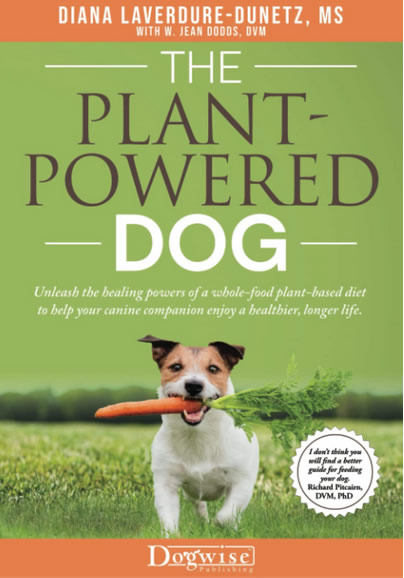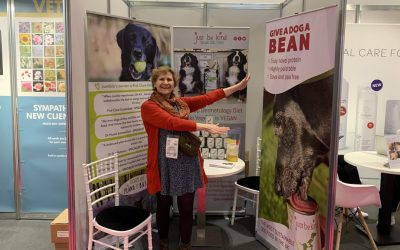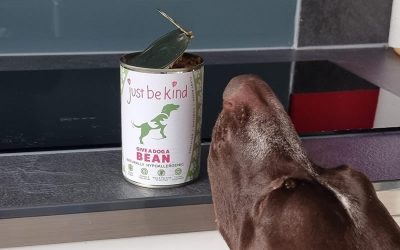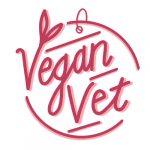What a treat to meet nutritionist Dr Diana Laverdure-Dunetz
Diana Laverdure-Dunetz, MS, holds a Master of Animal Science degree and is a multi award-winning dog health writer, vegan canine nutritionist and passionate animal advocate. I felt humbled to finally meet her (on Zoom) and hear her inspiring journey.
We share just SO much in common and could have spoken for hours, but I have included just a small snippet of our chat below speaking about her recently launched book ‘The Plant-Powered Dog’…
In the video below, Diana reminds us all how brave we are – SO inspiring!
The Editor of Vegan Runners UK has written such a great resumé about the book, that I have included it in the section below…
“We needed a ‘HOW NOT TO DIE’ for dogs to get everyone on the same page. The newly published ‘THE PLANT POWERED DOG’ fits the bill – and more.
This 379-page text is a combination of Michael Gregor’s now classic work boosted with a chunk of his forthcoming ‘HOW NOT TO AGE’ (out 5th Dec 2023).
If there is a dichotomy of views on this topic, this book is the means to unify understanding. According to this book, Vegan runners who proudly run with their plant-powered canine friends, can be 100% confident that their running companion will be thriving.
Those with doubts and guilty thoughts at imposing their vegan values on the dog can now find solace. Those who live within a mixed (vegan/omnivore) household will likely have a higher hurdle to leap for an evidence-based justification for a plant diet – they now have a bible of evidence.
At £25.32 it’s not cheap. The authors have impressive credentials having published 175 research papers. If your dog is not plant-powered and you are open-minded please read on. If your dog is plant-powered but you are not 100% confident, read on. If you are in a mixed household this will certainly be useful.
Let’s start with a few headline teasers.
• The evidence is strong that plant-powered dogs live typically 18 months longer than their traditionally counterparts.
• Vegan dogs have low risks of a range of chronic metabolic diseases, much less chance of cancer and reduced susceptibility to chronic inflammation and oxidative stress.
• Just like with humans there should not only be more years in the dog’s life but also more life in their years.
Consequently, your furry friend can be joining you for many more park runs.
A survey of 2,536 dogs over 12 months found that conventional diets are less healthy than raw meat or vegan diets. Almost half of the dogs fed a conventional omnivorous diet required medication at some point compared to 36% of vegan dogs.
The co-authors of Plant Powered dog are highly qualified and well experienced in dog nutrition. The lead author, Diane Laverdure-Dunetz has a Masters in Animal Science and has been a canine nutrition practitioner for over 25 years (the most recent 15 of those being plant-based).
The supporting author, Jean Dodd, is a qualified veterinarian and an expert in holistic canine medicine specialising in food intolerances; inflammation and autoimmune disorders. Both have either authored or contributed to many research papers on dog nutrition.
Diane became vegetarian in 2007 and Vegan in 2017. Jean has been vegetarian for 40 years. They have previously jointly authored two earlier books; The Canine Thyroid Epidemic (2011) and Canine Nutrigenomics (2015).
The book is structured in two parts. Part one covers the dog nutrition basics and the steps ensuring first class health for your canine. Part two provides helpfully detailed diets to address the common canine disorders. Just like in ‘HOW NOT TO DIE’ there are many references to the source research.
What is striking is the similarities between dog and human nutrigenomics and a root cause of many dog ailments results from undiagnosed chronic inflammation with adverse physiological impacts and brain and mood consequences. The authors cite pathogens, chemicals and toxins as a common cause of inflammation and explain the threat of bioaccumulation in the food chain (echoes of Rachael
Carlson’s Silent Spring).
There is also an emphasis on the epigenetic effects of nutrition being significantly more important than the underlying DNA. Promoting the pet’s healthy microbiome through diet and avoiding leaky gut are vital. ‘Conventional’ pet food is not ideal for a dog’s gut health. Plant food rocks for a healthy and diverse microbiome.
The book reminds us that a dog on an omnivore diet is yet another stress on planetary habitat; climate change and impacts animal welfare. The feed involves thousands of animals to be slaughtered over a dog’s standard lifetime.
Where dogs differ from humans
Whilst dogs and human digestion and metabolic processes are comparable in so many ways the authors detail where dog and human nutrition vary.
The recommended minimum protein intake for dogs is higher than humans at 18% compared to our 10%.
The authors explain that most conventional dog food is double the minimum protein which can have several harmful consequences. High protein does not equate with high quality.
Dogs are less capable of synthesising the amino acid Taurine than we humans. They need adequate B12 (which they might get from their outdoor activity but why take it to chance), vitamin D, vitamin E, choline, thiamine, copper and selenium. Guardians can be
confident of adequacy through either purchasing formulated food or using supplements. No surprises.
The book dives into plant digestibility, nutrient absorption, dog flatulence and stool formation. It’s all here. Researchers found plant diets to have acceptable palatability.
Dogs are like humans.
Plants diets are lower in fat with more beneficial antioxidant and phytochemicals – does this sound familiar? Plant sourced dog foods are generally better for a more stable glycaemic load. Who would have guessed?
Diet is a key risk factor of chronic inflammation in both people and animals. Cancer is a leading cause of death in both dogs and humans. Dogs can suffer ischaemic heart disease. Dogs can have food intolerances (70% have sensitivity to one or more animal or fish ingredients). In the UK approximately 64% of humans are overweight or obese – our canine friends are not far behind at 51%. Excess protein in traditional dog food causes weight gain – as it does in humans.
Plant foods like peas, lentils, and chickpeas are high in protein and easily digestible by dogs. Dog food companies have been using these plant-based protein sources for decades, and dogs in India have been on meatless diets for centuries.
Dog microbiome is similar to humans – a consequence of 10,000 years of adaptation in their domestication.
This list goes on.
Did you know that selective animal breeding over the decades led to higher fat (so called marbled) meat making it even less healthy than it was half a century ago?
Canine Athletes
This is where it really gets interesting. If you want to have the fittest, if not fastest dog in parkrun, then the plant diet rocks. The authors argue that the vegan diets helps avoid obesity; leads to sound metabolic processes; a superior glycolytic energy system and less oxidative stress.
Would you believe that greyhounds perform worse on a higher protein diet?
However, the references to dog based research on dog athletes exists but is not so copious and the authors cite examples human vegan athletes to support their argument.
In a 16-week controlled experiment in 2009, a meat-free diet maintained haematological characteristics in sprint-racing sled dogs (Siberian huskies). Those findings paved the way for plant-based commercial pet food manufacturers.
Let’s talk about poop – but no pictures though! Vegan dogs get more fibre and have firmer poop that’s easier to bag and less smelly. And they rarely suffer diarrhoea. Unless the dog is already thriving on a vegan diet, every guardian might want to buy their dog a copy of this book. But oh wait! The chances are your dog can’t read. If so, to keep a clear conscience you need to read this for them?
Alternative books are available but this one is bang up to date.” Article courtesy of Vegan Runners April 23


“As a vet, I believe in a kinder, healthier way to feed our pets that does no damage to our environment, harms no animals and uses fresh, healthy plant-based ingredients for a balanced and delicious diet”
Arielle Vegan Vet
“If nobody changes then nothing changes but if somebody changes then everything changes!”
Arielle Vegan Vet

Study Of Twins Shows Benefits Of Plant-Based Diet
A ‘Groundbreaking’ Study Of Identical Twins Finds Benefits Of Plant-Based Diet And Same In Dogs!
We share the same gut microbiome as our dogs!
Dr Arielle speaks at Vegfest London about the similarities between us and our dogs on a plant-based diet in reducing inflammation and healing auto-immune conditions
London Vet Show Highs and Lows
I returned home emotionally drained, but also feeling so much more positive about the future of plant-based dog nutrition with the contacts that were made
Give A Dog A Bean is SO tasty!
“Boston loved the tinned food and woofed it down in one go. It’s actually the best smelling dog food ever. Impressive stuff!”
Should All Dogs Go Plant-Based?
Dr Arielle Griffiths is interviewed on live TV Channel 5 and shows Jeremy Vine how delicious vegan dog food is
Oldest living dog Bobi dies aged 31!
How your dog can live as long as Bobi eating a wholefood balanced diet as oldest vegan dog lived until she was 25!










